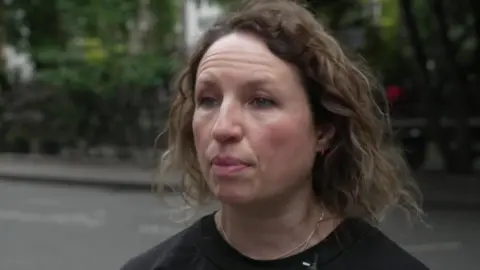Park staff trained to tackle harassment of women
 Getty Images
Getty ImagesPark staff across London are being trained to spot and respond to harassment, as part of a new drive to make green spaces safer for women and girls.
The training, developed by the Suzy Lamplugh Trust and the University of Leeds, will give staff the tools to step in when they see inappropriate behaviour. Members of the public can also sign up for the course.
Campaigners say many women avoid parks, especially after dark, due to safety concerns.
The charity which campaigns against stalking and harassment is also calling for better lighting, more staff, and for women to have a say in how parks are designed.
"The kinds of behaviours this training would assist with include inappropriate comments, gestures, cat calling or even unwanted touching," said Saskia Garner from the Suzy Lamplugh Trust.
"Someone sitting down next to you on a bench and putting their arm around you – anything that makes you feel unsafe is not OK."
Ms Garner added that many people want to help but are unsure how to act safely.

"You wouldn't go in a park by yourself after dark or even with one other person because it doesn't feel safe," one woman told BBC London in the Regent's Park.
Another added: "[Parks aren't] not very well lit... in the one where I live there are no street lamps."
The Suzy Lamplugh Trust, set up after the 1986 disappearance of estate agent Suzy Lamplugh, works to reduce violence and harassment through training and support.
"People don't feel they can intervene," Ms Garner said.
"They worry about making things worse. The women we spoke to said they didn't feel safe to challenge the harassment and didn't think anyone would help them."
The scheme encourages the idea of "active bystanders" – people who feel confident to intervene without putting themselves at risk.
"This training gives people safe tools to step in. Whether by distracting someone or helping to report what's happened. But it always prioritises your safety and what's right for that moment," Ms Garner added.
Posters will soon appear in parks and community centres across London, encouraging people to sign up.
Dr Anna Barker, from the University of Leeds, said: "We want to build a community of active bystanders… so people feel more confident and connected, and better able to act when they see harassment."
The training is being rolled out using Keep Britain Tidy's Green Flag Award network across England and Wales, the University of Leeds said.
Listen to the best of BBC Radio London on Sounds and follow BBC London on Facebook, X and Instagram. Send your story ideas to [email protected]
